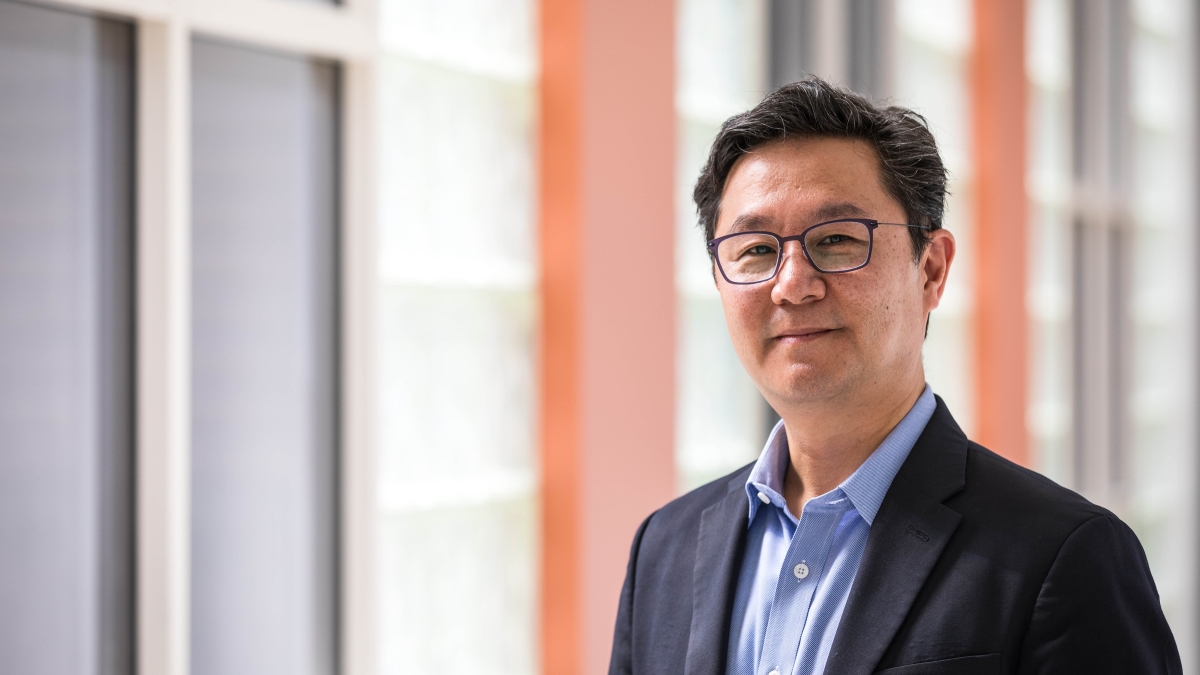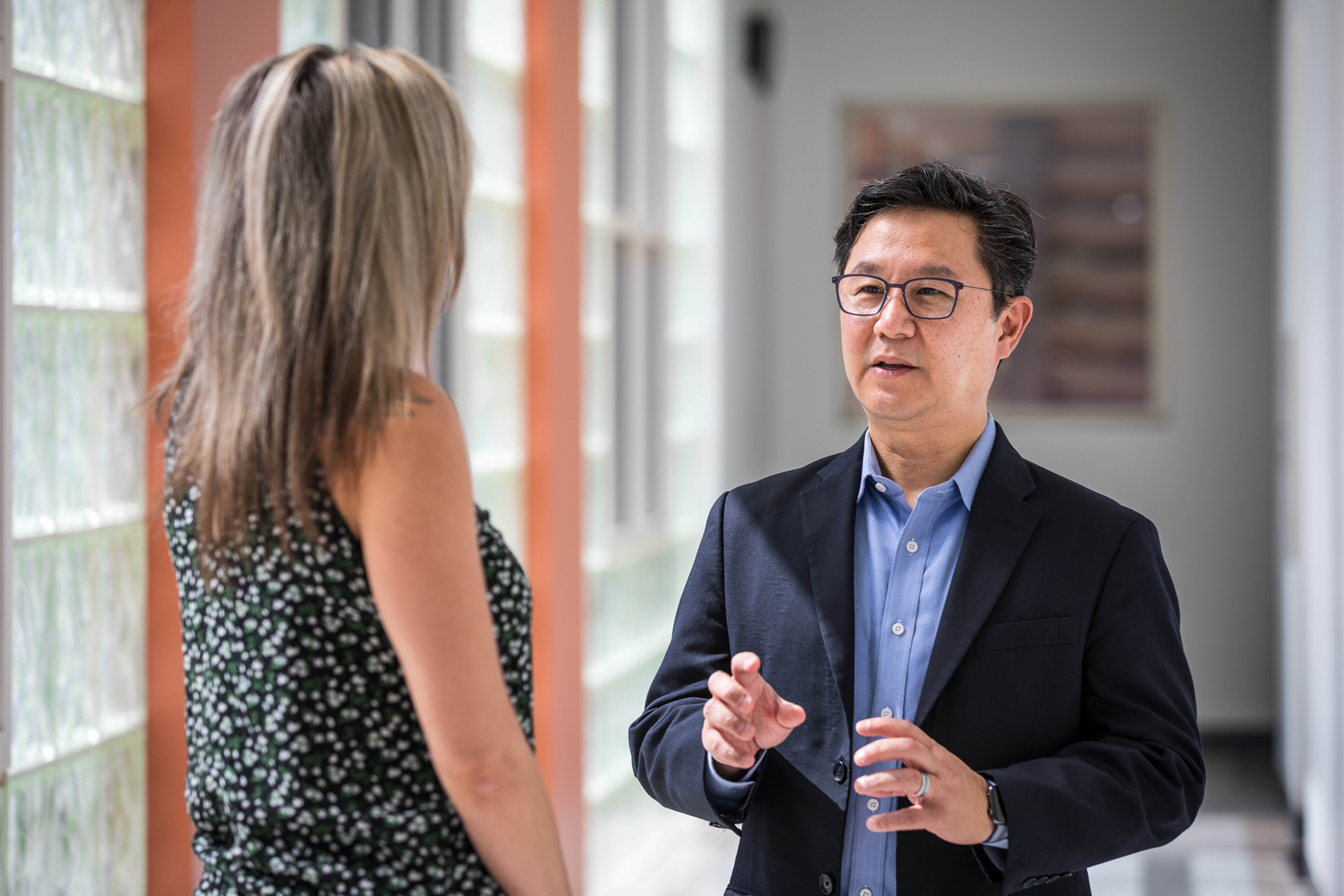ASU School of Life Sciences selects new director

Professor Kenro Kusumi, a genome biologist, has been selected as the new director for Arizona State University’s School of Life Sciences. Photo by Charlie Leight/ASU Now
Professor Kenro Kusumi, a genome biologist, has been selected as the new director for Arizona State University’s School of Life Sciences, effective immediately. Kusumi served as interim director for the school for the past six months.
He joined ASU in 2006 as an associate professor and has held additional leadership positions, including associate dean of research and digital initiatives and associate dean of graduate programs. His lab uses genomic approaches to address questions about animal evolution, with direct impact on biomedical and environmental challenges. Along with ASU colleagues, Kusumi is uncovering the molecular instructions required for regeneration in the lizard. By deciphering the genome of the desert tortoise, a hallmark animal of the American Southwest, his group is working with state and federal agencies to help conserve this threatened species.
“Professor Kusumi brings an outstanding record of scientific research, teaching and strong leadership to his new role as director of the School of Life Sciences,” said Nancy Gonzales, dean of natural sciences with The College of Liberal Arts and Sciences. “We are confident in his ability to help build even stronger collaborations of interdisciplinary research, as well as support top-notch degree programs in the life sciences. Also, we are grateful to Professor Bert Jacobs for his years of service and dedication to the success of the School of Life Sciences.”
The school is the largest academic unit within The College, housing dozens of graduate and undergraduate degree programs, as well as thousands of students, both on campus and online. The school is known for innovation in education. It recently launched the country’s first completely online Bachelor of Science biological sciences degree program.
“The School of Life Sciences is an educational innovator, creating entirely new approaches for learning in the 21st century,” Kusumi said. “By breaking down barriers, we have been able to foster transformative and interdisciplinary research in the life sciences. This is an exciting and pivotal time for our school, and I am truly honored to have the opportunity to serve as director.”
He received his doctorate from MIT and completed his postdoctoral training at the National Institute for Medical Research in London. Before coming to ASU, he taught at the University of Pennsylvania School of Medicine and the Children’s Hospital of Philadelphia, where he served as director of pediatric orthopedic basic research.
“In his leadership roles at The College, we’ve come to know Professor Kusumi’s complete dedication not only to the job at hand, but also to ASU’s charter for inclusion, advancing research and discovery, and assuming the fundamental responsibility for the communities we serve,” said Patrick Kenney, dean of The College. “With his leadership experience, as well as scientific and teaching expertise, we are confident he will lead the school to even greater success.”
Along with his directorship, Kusumi will also assume a new role in The College as associate dean of strategic partnerships.
Professor Kenro Kusumi, the new director of the ASU School of Life Sciences, talks with Jennifer Cox, a senior business operations manager at the school. Photo by Charlie Leight/ASU Now
About the school
Established in 2003 as the first interdisciplinary school in President Michael Crow’s vision for a New American University, the School of Life Sciences serves as a hub for interdisciplinary centers, institutes and attracting research talent. Dynamic laboratories, state-of-the-art technologies and a vast expansion of research infrastructure now support more than 4,000 students and 100 faculty members. From Pulitzer Prize winners to young entrepreneurial thought leaders, life sciences faculty pursue discovery and translational research, providing an entrepreneurial climate to bring the best research ideas to fruition.
More Science and technology

ASU-led Southwest Advanced Prototyping Hub awarded $21.3M for 2nd year of funding for microelectronics projects
The Southwest Advanced Prototyping (SWAP) Hub, led by Arizona State University, has been awarded $21.3 million in Year 2 funding…

Celebrating '20 Years of Discovery' at the Biodesign Institute
Editor’s note: The Biodesign Institute at Arizona State University wraps up its 20th anniversary with the sixth and final…

Student research supports semiconductor sustainability
As microelectronics have become an increasingly essential part of modern society, greenhouse gas emissions, which are associated…
